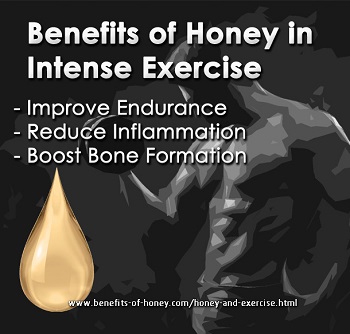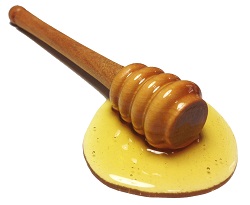honey and exercise
How Honey and Exercise are Related and You could Benefit in 3 Great Ways
Intense Exercise Can Weaken Immunity
Now this can be surprising for many – studies have shown that too much intense exercise can weaken immunity and make you more prone to illness (Plos One Journal, 2015). During intense physical exertion or extreme exercise, such as marathon or triathlon, the body produces stress hormones, such as cortisol and adrenaline that raise blood pressure and cholesterol levels and suppress the immune system.
Here are the three ways honey can benefit your health in your workouts.
1. Honey Increases Endurance
Honey has long been recognized as a great fuel for exercise. Ingesting it before, during, or immediately after exercise can help to maintain performance and improve endurance capacity. Three studies by Richard Kreider of Baylor University showed that honey might be a natural and effective carbohydrate alternative to sports drinks and bars. Great news for athletes and anyone who’s looking for a natural energy boost.
“Our first study suggested honey could operate as a time release muscle fuel for exercise. Our second experiment suggested that honey would be a good carbohydrate source to replenish muscles. However, our last study convinced us that honey can improve endurance exercise capacity.”
Dr. Kreider, University of Memphis Exercise and Sport Nutrition Laboratory.
2. Honey Reduces Inflammation

A research study went further and showed that consuming 70g honey prior to each training session over periods of eight to 16 weeks could reduce the negative inflammatory effects of intense exercise (Nutrients, 2019). Oxidative stress levels were reduced for participants who consumed honey. The natural antioxidant properties of honey appeared to be able to prevent free radical damage caused by stress in exercise and speed up recovery.
3. Honey Boosts Bone Health
The same article also reported that consumption of honey combined with an exercise programme over six weeks could lead to significant increases in serum alkaline phosphatase, indicating greater bone formation. It was suggested that components such as vitamin K, and minerals such as calcium, phosphorus, iron, and magnesium found in honey could contribute to improved bone health.
What’s in Honey?
Honey comprises 80% carbohydrate (with 1:1 ratio of glucose and fructose) and 19% water, and contains many other components such as organic acids, proteins, amino acids, minerals, polyphenols, vitamins, aroma compounds, and about 500 enzymes. It also possesses antioxidant, antimicrobial, and anti-inflammatory properties and antibacterial substances such as polyphenols. The glycaemic index (GI) of honey ranges from 32 to 85, depending on botanical source. Low GI honey floral varieties produce a lower insulinemic response and a slower delivery of glucose into the systemic circulation, thus helping to maintain our blood glucose levels.
Related Pages on Honey and Exercise

1. Honey is the best fuel for the liver during exercise. Details in: 1 Truth Athletes Must Know About Energy Food.
2. Eat honey before, during and after workout to improve energy levels and recovery times. Check out Honey Energy Drink.
3. Resistance exercise can raise metabolic rate and help us burn more calories. More in: Jump unto the Resistance Exercise Bandwagon!.
4. If you need to motivate yourself to exercise, read: 6 Great Reasons Why We Need to Exercise.
5. The lymphatic system – probably the most neglected system of the human body. More in: Exercise is #1 Factor for Healthy Lymphatic System.
6. Take up this challenge – drink honey water morning and night as a daily regimen for three months and see the positive effects on your health. Check out: Honey Water Challenge.
7. Energy drinks, a new wave of concoctions with big punches of caffeine, sugar, high fructose corn syrup, herbs and other substances are all the rage on campuses, bars and dance clubs. More in: 3 Most Harmful Energy Drink Side Effects (Beware!)